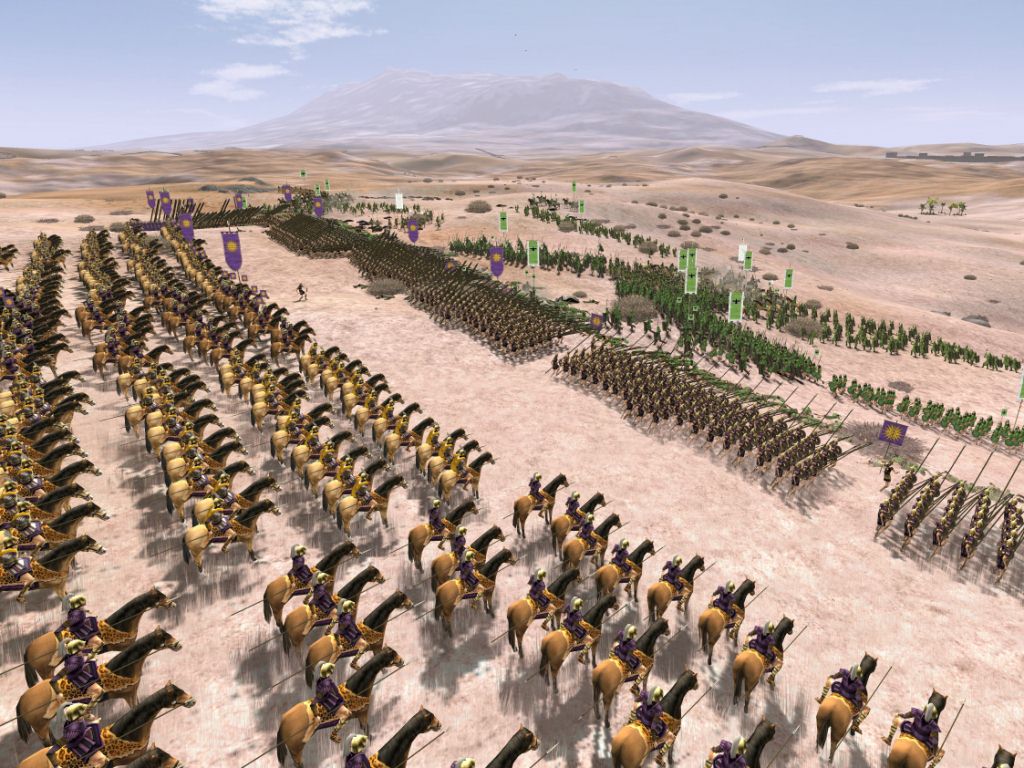Jabrosky
Banned
When I was a kid I was a big fan of real-time strategy games, the kind where you build up an army and have it crush your enemies and sack their towns. Age of Empires, Age of Mythology, Rise of Nations, and the Total War series are the best examples of this genre in my opinion. These games have instilled in me an interest in ancient warfare, and after recently playing Rise of Nations again, I feel like writing a battle story that would incorporate real-time strategy elements.
For example, one common element in real-time strategy games is an elevated point of view you might call aerial or bird's eye. The camera doesn't shoot through the eyes of any one particular character, but instead hovers overhead. However, it can still zoom in on individual platoons or zoom out to give you a view of the whole battlefield. Here are a couple of screenshots illustrating this:


It might seem that this aerial viewpoint is equivalent to the so-called third person omniscient in literature, but I submit there is a critical difference. One of the most commonly cited problems with third-person omniscient is the phenomenon of head-hopping (i.e. switching between the viewpoints of individual characters), but this would not exist in an aerial viewpoint since you're not actually going into any individuals' minds. You can see them fight, hear them talk, and maybe see their facial expressions and body language if the camera zooms in really close, but you don't actually have to worry about their internal psychologies. Instead you can just enjoy the larger view of the battle in all its fiery and blood-soaked spectacle.
I'm sure this can be done, but since I would be taking such a detached view of this story's characters, I still feel it might pose a challenge to keep the story engaging. The conventional wisdom among today's writers is that only character-centric stories can engage readers. Personally I can enjoy character-centric stories as much as anyone else (they've constituted most of the books I've read after all), but I submit that there are more ways to make a story interesting than fixating on individual characters. For example, I could write a lot of vivid sensory descriptions to bring the battle to glorious and horrific life in my readers' imaginations.
Any thoughts on this approach?
For example, one common element in real-time strategy games is an elevated point of view you might call aerial or bird's eye. The camera doesn't shoot through the eyes of any one particular character, but instead hovers overhead. However, it can still zoom in on individual platoons or zoom out to give you a view of the whole battlefield. Here are a couple of screenshots illustrating this:


It might seem that this aerial viewpoint is equivalent to the so-called third person omniscient in literature, but I submit there is a critical difference. One of the most commonly cited problems with third-person omniscient is the phenomenon of head-hopping (i.e. switching between the viewpoints of individual characters), but this would not exist in an aerial viewpoint since you're not actually going into any individuals' minds. You can see them fight, hear them talk, and maybe see their facial expressions and body language if the camera zooms in really close, but you don't actually have to worry about their internal psychologies. Instead you can just enjoy the larger view of the battle in all its fiery and blood-soaked spectacle.
I'm sure this can be done, but since I would be taking such a detached view of this story's characters, I still feel it might pose a challenge to keep the story engaging. The conventional wisdom among today's writers is that only character-centric stories can engage readers. Personally I can enjoy character-centric stories as much as anyone else (they've constituted most of the books I've read after all), but I submit that there are more ways to make a story interesting than fixating on individual characters. For example, I could write a lot of vivid sensory descriptions to bring the battle to glorious and horrific life in my readers' imaginations.
Any thoughts on this approach?

 Sage
Sage
 Auror
Auror Myth Weaver
Myth Weaver Maester
Maester Dreamer
Dreamer